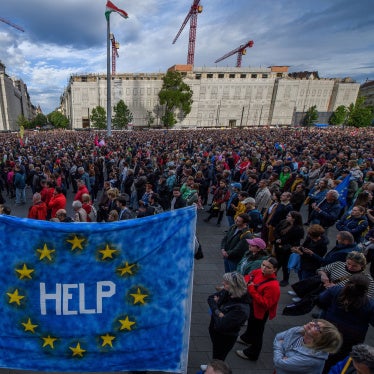Today Human Rights Watch launches its 24th World Report, an annual review of human rights practices around the world. The report addresses the very grave crimes that have been committed in Syria by government forces and some rebel groups, crimes which our researchers have painstakingly and systematically documented, and it highlights the shameful response to this crisis from Russia and China, which have consistently blocked effective international action.
Over some 667 pages, the report also highlights abuses elsewhere in the Middle East, as well as in Asia, Africa, Europe and the Americas.
But what are the implications of this report closer to home? William Hague has repeatedly claimed that human rights are at the heart of Britain’s foreign policy, and that ministers and diplomats press human rights concerns “whenever and wherever they arise”.
While there are many areas where Britain is doing excellent work on human rights, for example on issues like sexual violence in conflict or combating the use of the death penalty, there are other areas where UK policy falls significantly short. Three in particular are worth highlighting.
Firstly, there are a number of important countries where the British government appears very reluctant to press human rights concerns with sufficient vigour or consistency. Saudi Arabia, China and Uzbekistan all fall into this category.
Over the last year, the Saudi authorities have shown growing intolerance towards citizens advocating reform. Eight prominent human rights activists have been convicted on broad, catch-all charges, such as “trying to distort the reputation of the kingdom”, and Saudi women and girls continue to suffer systematic discrimination through the male guardianship system.
Yet the British government’s response to these abuses is extremely muted. In China, British ministers have lauded the country’s economic achievements and the potential for greater trade and investment. But they have failed to apply sustained pressure over massive ongoing human rights violations, including repression in Tibet and Xinjiang, the detention and arrest of activists, and severe restrictions on freedom of expression and association.
In Uzbekistan, the British government has reached a deal with Tashkent to “gift” certain leftover military equipment from the war in Afghanistan, but said precious little about the country’s truly abysmal human rights record, including a criminal justice system in which torture is endemic.
In these three cases and others the British government, consistent with its declared policy, should be pressing human rights concerns much more strongly.
Secondly, the British government is failing to fully adhere to its obligations under the UN Convention on Torture, a point highlighted last year by the UN Committee on Torture. In a shocking breach of previous assurances, the Government announced last month that it is shelving plans to undertake a proper judge-led inquiry into British involvement in overseas rendition and torture.
This is despite the fact that Human Rights Watch uncovered evidence in September 2011 that British security services were complicit in the rendition of Sami al-Saadi and Abdul Hakim Belhaj to Libya under Muammar Gaddafi, and in the torture of British citizens and residents in Pakistan between 2004 and 2007.
The British government has said that the Intelligence and Security Committee should have responsibility for further investigations. Yet this body has a poor track record of holding the security services to account. David Cameron has rightly said that these revelations have “stained our reputation” as a country. But this broken promise over the torture inquiry will do nothing to erase that stain or restore Britain’s reputation.
Thirdly, British government ministers should curb their frequent and ill-judged attacks on the European Convention on Human Rights (ECHR). Drafted in the 1950s with the support of Winston Churchill and extensive British involvement, the Convention has proved its worth over the past 60 years in protecting and promoting rights for people across 47 countries in Europe.
Its case law has helped to end commonplace torture in custody, promote equal treatment for women and lesbian and gay people, ban corporal punishment in schools, end abusive interrogation practices by the British army in Northern Ireland, and uphold the freedom of the media to publish articles in the public interest, against the wishes of the authorities.
Mr Hague’s ability to credibly raise human rights concerns with other governments would be gravely damaged were Britain to withdraw from the European Convention on Human Rights, a dangerous and misguided policy position endorsed by some of his ministerial colleagues.
Those who suffer abuses around the world need Britain to consistently and strongly champion international human rights, and the institutions that help to further them.








